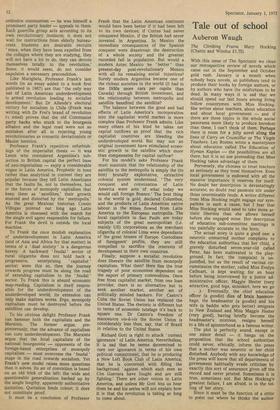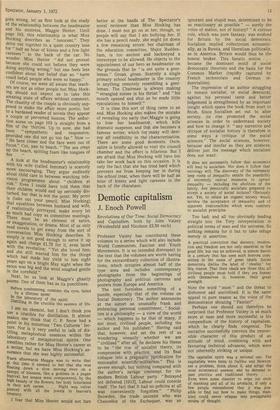Tale out of school
Auberon Waugh
The Climbing Frame Mary Hocking (Chatto and Windus £1.75) With this issue of The Spectator we close our retrospective review of novels which came out in the September and October gold rush. January is a month when nobody buys novels, so publishers tend to produce their books by foreign authors, or by authors who have the misfortune to be dead. In many ways it is sad that we should spend our last hours among living fellow countrymen with Miss Hocking. She writes about teachers, about education and about local government — and if there are three topics in the whole social panorama more likely to produce boredom than these, I can't think of them. Perhaps there is room for a jolly novel along the lines of Carry on Councillor or The Virgin Teachers. Leo Rosten wrote a masterpiece about education called The Education of Hyman Kaplan — the possibilities are all there, but it is no use pretending that Miss Hocking takes advantage of them.
Perversely, she chooses to treat teachers as seriously as they treat themselves. Even local government is endowed with all the massive importance it reserves for itself. No doubt her description is devastatingly accurate; no doubt real passions stir under those interminable feuds. A writer different from Miss Hocking might engage our sympathies in such a cause, but I fear that Miss Hocking would need to take more artistic liberties than she allows herself before she engaged mine. Her description of education sub-committee meetings is too painfully accurate to the born.
The actual story is quite a good one: a neurotic unmarried mother complains to the education authorities that her child, a gravely disturbed seven-year-old called Peter, has been maltreated in the playground. In fact, the complaint is unjustified, but as the result of various circumstances the mother, called Miss Evelyn Cathcart, is kept waiting for an hour before being interviewed by a junior administrative officer, Maggie Hester (very attractive, good legs, miniskirt, here we go . . .). Eventually, the chief education officer (a goodie) dies of brain haemorrhage, the headmaster (a goodie) and his wife (a baddie who gets better) emigrate to New Zealand and Miss Maggie Hester (very good), having briefly become the headmaster's mistress, resigns herself to a life of spinsterhood as a famous writer.
The plot is perfectly sound, except in one minor detail — it hangs on the proposition that the school authorities could never, ethically, inform the press that a mother was neurotic or her child disturbed. Anybody with any knowledge of the press will know that all departments of government habitually evade criticism by exactly this sort of assurance given off the record and never printed. Sometimes it is true, sometimes not. But Miss Hocking's greatest failure, I am afraid, is in the telling of her story.
Since it must be the function of a critic to point out where he thinks the author goes wrong, let us first look at the study of the relationship between the headmaster and his mistress, Maggie Hester, Until page 103, this relationship is what Miss Hocking describes as " innocent." They drive out together to a quiet country lane for "half an hour of kisses and a few light caresses" in the back of the car. No wonder Miss Hester "did not protest because she could not believe they were doing anything wrong," but one feels less confident about her belief that no "harm could befall people who were so happy." Of course, we were all aware that teachers are not as other people but Miss Hocking should not expect us to take this amazing state of affairs without comment. The chastity of the couple is obviously supposed to make the affair more poetic, but to a hardened reader of novels they appear a couple of perverted loonies. The seduction scene on page 103 is straight from a film of the 'thirties. Up to now, she had been "sympathetic and responsive, provided one did not go too far." Now — "He bent closer and the face went out of focus." Cut, pan to beach. "The sea crept up the beach, spitting foam like tongues of fire . . ."
A look at the headmaster's relationship with his wife (called Jemima!) is scarcely more encouraging. They argue endlessly about child care in between watching television programmes about "children at risk." Even I could have told them that their children would end up seriously disturbed, but that is not the point. My point is (take out your pencil, Miss Hocking) that squabbles between husband and wife, if realistically portrayed, make every bit as much bad copy as committee meetings. There must be an element of satire, or exaggeration, or drama. Most of us only read novels to get away from the sort of conversation Miss Hocking describes. It simply is not good enough to serve it up again and charge £1.75 for it, even laced with the revelation: "Yet she loved him; and she still wanted him for the things Which had made her yield to him eight years ago on a bright May night when the moon was big and the wind soughed gentle in the cornfield."
Next, let us look at Maggie's ghastly poems. One of them has as its punchlines:
Before condemning, consider the eyes, faded by a lifetime spent
In the laboratory of the spirit Distilling in the crucible the essence of life.
I am no chemist, but I don't think you use a crucible for distillation. It almost makes one think that C. P. Snow had a point in his notorious Two Cultures' lecture. Nor is it very useful to talk of distilling metaphorical essences within the laboratory of metaphorical spirits. One trembles rather for Miss Hester's career as a writer, but we have Miss Hocking's assurance that she was highly successful: Years afterwards Maggie was to write that at this time it seemed to her that she was floating down a slow moving river on a canopy of blossom, like a goddess in a pagan festival; her senses were overpowered, by the high beauty of the flowers, her body luxuriated in their soft caress. . . , Night was velvet pierced with all the jewels in heaven's treasury.
I fear that Miss Hester would not fare better at the hands of The Spectator's novel reviewer than Miss Hocking has done. I must not go on at her, though, or people will say that I am bullying her. If she has a pencil ready, she might jot down a few remaining errors: her chairman of the education committee, Major Ruddenham, is too ancient and hackneyed a stereotype to be allowed. He objects to the appointment of our hero as headmaster on the grounds that he "is not quite a gentleman." Groan, groan. Scarcely a single primary school headmaster in the country is anything remotely resembling a gentleman. The Chairman is always making " strangled noises in his throat" and "his mouth opened and shut as he made little 'ejaculations to himself."
It is time this sort of t ing came to an end. Miss Hocking also m kes the mistake of revealing too early that Maggie is going to lose her headmaster, which kills dramatic suspense, and th t she becomes a famous writer, which for Imai4y will destroy all credibility in the characterisation. There are some go pd oments. Once, satire is briefly allowed to visit the council chamber and the effect is hilarious. But I am afraid that Miss Hocking will have too take her work back on this occasion. It is only the fact that she has tried hard which prevents me from keeping her in during the school treat, when there will be half an hour of kisses and light caresses in the back of the charabanc.















































 Previous page
Previous page